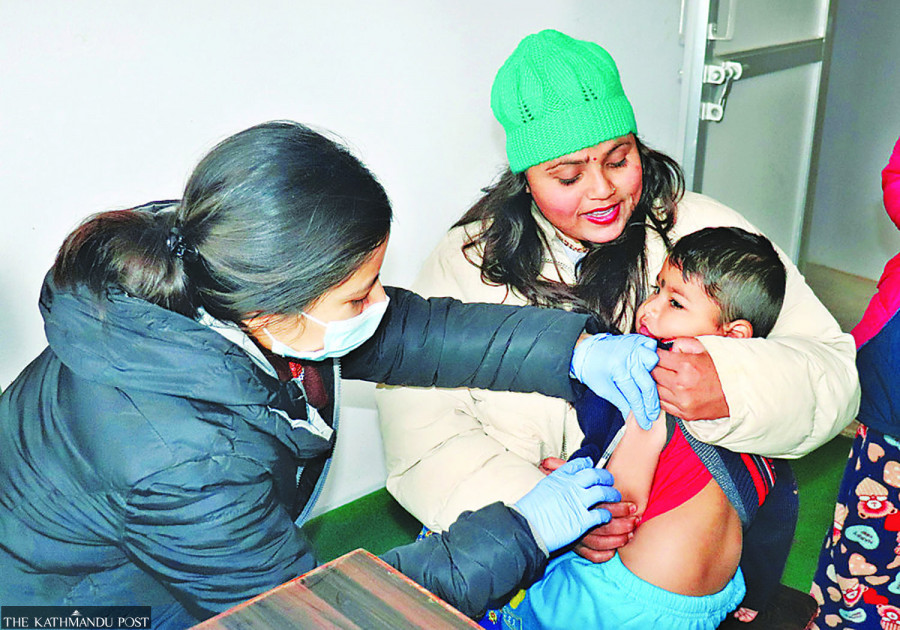Health
Health officials seek religious leaders’ help in Banke measles vaccination drive
Officials hope that vaccine coverage will be increased with the help of preachers, as people of certain religious groups trust them more than health workers.
Arjun Poudel
Amid the spread of measles virus in several local units of Banke, health authorities have sought help from religious leaders, especially Muslim preachers (Maulanas), in the ongoing immunisation drive.
Officials hope that vaccine coverage will be increased with the help of preachers, as people of certain religious groups trust them more than health officials.
“We have been taking help from religious leaders, especially Maulanas, in the ongoing vaccination drive,” said Dr Bikash Devkota, secretary for Health and Population in Lumbini Province. “Coverage of immunisation drives has improved significantly with their help.”
The outbreak of measles virus in Nepalgunj Sub-metropolitan City has spread to Kohalpur Municipality, Narainpur Rural Municipality, Khajura Rural Municipality and Duduwa Rural Municipality.
Officials said that one death and 246 cases of infection had been reported until Friday evening. They also conceded that there could be hundreds of other cases in the communities as not all cases are reported.
“The immunisation drive is ongoing in all the affected local units, including in Nepalgunj Sub-metropolitan City,” Naresh Shrestha, a key vaccination official at the Health Office Banke, told the Post over the phone from Nepalgunj. “We have already immunised more children than the estimate and the vaccination programme is still continuing.”
After the outbreak of the deadly virus, health authorities have been administering a measles vaccine targeting all children aged between six months and 15 years.
With measles cases detected in Narainpur Rural Municipality, health authorities started an immunisation campaign on Thursday. Narainpur, a remote municipality in the district’s midwestern region, was one of the worst-hit areas when the Covid pandemic gripped the country in the spring of 2020.
“We have already administered a vaccine to more than 8,000 children out of the targeted 14,000,” said Alam Khan, press adviser to Istiyaq Ahmad Shah, chairman of the rural municipality. “Our chairman, who is also a Maulvi [an expert on Islamic Law] has been urging locals for immunisation, which has helped us in accelerating vaccination.”
Devkota, the secretary for health of Lumbini Province, said that some changes can be seen in the behavioural patterns of people ever since they took the help of religious scholars and maulanas. “Without their help and active participation, it is challenging to convince people in our area to access the health services offered by the government,” he said.
Low vaccination coverage, internal migration, lack of awareness of the importance of vaccines and government apathy are the reasons given for regular outbreaks of measles in the districts, according to health experts.
Officials say most measles outbreaks have been reported among the marginalised and minority religious communities—Muslims and Catholics—as well as other backward groups where the level of awareness of regular immunisation is low.
Measles is a contagious disease transmitted through fluids from the nose, mouth or throat of infected persons and through air. The virus infects the respiratory tract, and then spreads throughout the body. It remains a big cause of death among young children globally, despite the availability of a safe and effective vaccine, according to the World Health Organisation.
Nepal had committed to eliminating measles by 2023. To declare measles as eliminated, the number of cases should be less than five in every one million people throughout the year.
Measles was endemic in Nepal. In the past, hundreds of children would die every year in the country from the potentially fatal contagion.
Routine measles vaccinations in Nepal began in 1979, starting with three districts. The campaign was extended nationwide after 10 years. Despite measles being included in the regular immunisation list, an average of 90,000 cases were recorded every year from 1994 to 2004.




 20.12°C Kathmandu
20.12°C Kathmandu















